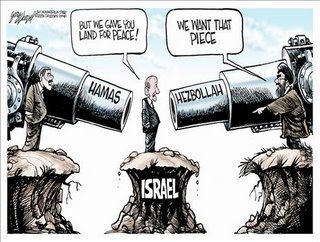Some excerpts:-
The failure of Israel to subdue Hezbollah demonstrates the many weaknesses of the war-on-terror concept. One of those weaknesses is that even if the targets are terrorists, the victims are often innocent civilians, and their suffering reinforces the terrorist cause.
In response to Hezbollah's attacks, Israel was justified in attacking Hezbollah to protect itself against the threat of missiles on its border. However, Israel should have taken greater care to minimize collateral damage. The civilian casualties and material damage inflicted on Lebanon inflamed Muslims and world opinion against Israel and converted Hezbollah from aggressors to heroes of resistance for many. Weakening Lebanon has also made it more difficult to rein in Hezbollah.
Another weakness of the war-on-terror concept is that it relies on military action and rules out political approaches. Israel previously withdrew from Lebanon and then from Gaza unilaterally, rather than negotiating political settlements with the Lebanese government and the Palestinian authority. The strengthening of Hezbollah and Hamas was a direct consequence of that approach. The war-on-terror concept stands in the way of recognizing this fact because it separates "us" from "them" and denies that our actions help shape their behavior.
...There are strong voices arguing that Israel must never negotiate from a position of weakness. They are wrong. Israel's position is liable to become weaker the longer it persists on its present course. Similarly Hezbollah, having tasted the sense but not the reality of victory (and egged on by Syria and Iran) may prove recalcitrant. But that is where the difference between Hezbollah and Hamas comes into play. The Palestinian people yearn for peace and relief from suffering. The political - as distinct from the military - wing of Hamas must be responsive to their desires. It is not too late for Israel to encourage and deal with an Abbas-led Palestinian unity government as the first step toward a better-balanced approach. Given how strong the U.S.-Israeli relationship is, it would help Israel achieve its own legitimate aims if the U.S. government were not blinded by the war-on-terror concept.
Here's the letter I submitted for publication:
George Soros asserts that a weakness of the war-on-terror concept is that it "rules out political approaches". Not really in the case of Israel.
Soros' presumption is wrong. In the first instance, Israel has always followed a political course, and has even been forced to do so, including secret negotiations (the Oslo DOP), international (Madrid), open (Oslo II) and otherwise. Secondly, especially in the case of the Arab-Islamic offensive on Israel, which began with riots in 1920 even before the state was created, the issue is not one that can be solved.
No amount of territory yielded, no quality of rights awarded and no quantity of integration by Israel can satify the demands of this terror.
And one of my 'pen pals' sent me his submitted letter:-
If Arabs cared about Lebanese civilians, they would not praise Hezbollah for foisting a war on these civilians and using them as human shields. What Arabs really care about is their own dignity, which they have made synonymous with defeating the Jews. The right way to achieve dignity is by building enviable societies and creating inventions that earn worldwide respect; but that is hard and takes time. How much easier to latch onto some perceived injustice, and bingo -- your life instantly feels meaningful and dignified! Why spend years studying and working, when you can just pick up a portrait of Sheikh Nasrallah and instantly feel like you're a part of a victorious army!
George Soros needs to understand that such sentiments cannot be addressed by appeasement. They can only be addressed by publicly pointing out exactly what's going on.













